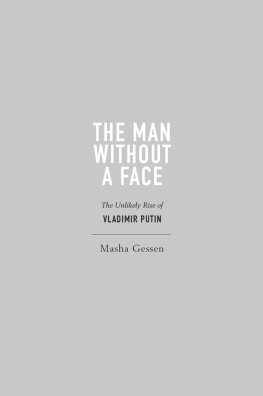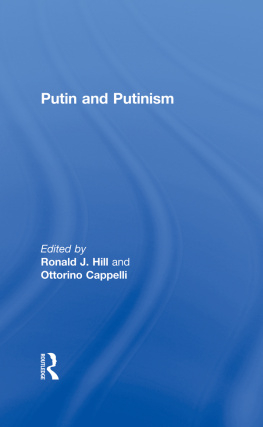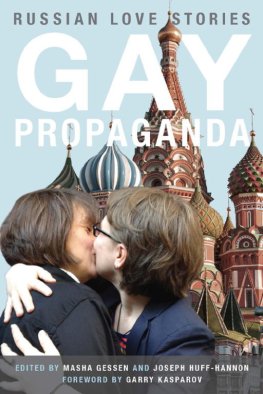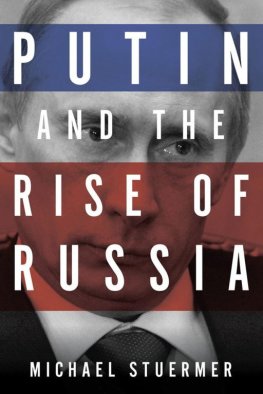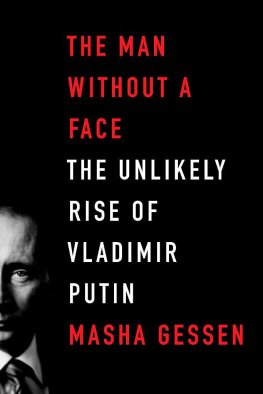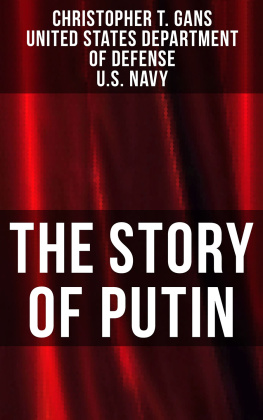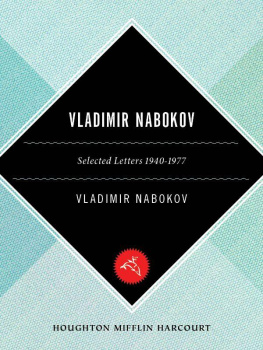THE MAN
WITHOUT
A FACE
The Unlikely Rise of
VLADIMIR PUTIN

Masha Gessen

RIVERHEAD BOOKS
Published by the Penguin Group
Penguin Group (USA) Inc., 375 Hudson Street, New York, New York 10014, USA
Penguin Group (Canada), 90 Eglinton Avenue East, Suite 700, Toronto, Ontario
M4P 2Y3, Canada (a division of Pearson Penguin Canada Inc.) Penguin Books Ltd, 80 Strand, London WC2R 0RL, England Penguin Ireland, 25 St Stephens Green, Dublin 2, Ireland (a division of Penguin Books Ltd) Penguin Group (Australia),
250 Camberwell Road, Camberwell, Victoria 3124, Australia
(a division of Pearson Australia Group Pty Ltd) Penguin Books India Pvt Ltd,
11 Community Centre, Panchsheel Park, New Delhi110 017, India Penguin Group (NZ), 67 Apollo Drive, Rosedale, North Shore 0632, New Zealand
(a division of Pearson New Zealand Ltd) Penguin Books (South Africa) (Pty) Ltd, 24 Sturdee Avenue, Rosebank, Johannesburg 2196, South Africa
Penguin Books Ltd, Registered Offices: 80 Strand, London WC2R 0RL, England
Copyright 2012 by Masha Gessen
All rights reserved. No part of this book may be reproduced, scanned, or distributed in any printed or electronic form without permission. Please do not participate in or encourage piracy of copyrighted materials in violation of the authors rights. Purchase only authorized editions. Published simultaneously in Canada
Library of Congress Cataloging-in-Publication Data
Gessen, Masha.
The man without a face : the unlikely rise of Vladimir Putin /
Masha Gessen.
p. cm.
EISBN: 9781101560600
1. Putin, Vladimir Vladimirovich, 1952. 2. PresidentsRussia (Federation).
3. Russia (Federation)Politics and government1991. I. Title.
DK510.766.P87G47 2012 2011047578
947.0862092dc23
[B]
Printed in the United States of America
1 3 5 7 9 10 8 6 4 2
BOOK DESIGN BY AMANDA DEWEY
While the author has made every effort to provide accurate telephone numbers and Internet addresses at the time of publication, neither the publisher nor the author assumes any responsibility for errors, or for changes that occur after publication. Further, the publisher does not have any control over and does not assume any responsibility for author or third-party websites or their content.
PROLOGUE
I woke up because someone was shaking me. Kates face looked terrified. They are saying something about Galina on the radio, she half whispered. And a gun. I think I dont understand.
I got out of bed and stumbled into the tiny kitchen, where Kate had been making breakfast and listening to Echo Moskvy, the countrys best news and talk radio station. It was a Saturday morning, unusually light and crisp for November in Moscow. And I was not worried: somehow, Kates fear did not impress me. Whatever she had heardor, with her limited Russian, misheardmight be the beginning of yet another great story. As the chief correspondent for Russias leading newsmagazine, Itogi, I felt all great stories were my fiefdom. And there were a lot of great stories. In a country that was inventing itself, every city, every family, and every institution was, in some sense, uncharted territory. The year was 1998. Since the early 1990s, virtually every piece I wrote was a tale no one had told before: I spent about half my time outside Moscow, traveling to conflict zones and gold mines, orphanages and universities, abandoned villages and burgeoning oil towns, writing their stories. The magazine, which was owned and financed by the same magnate as Echo Moskvy, rewarded me by never questioning my extravagant travel schedule and by frequently placing my stories on the cover.
In other words, I was one of those young people who had gained everything in the 1990s. Many people older and younger than I was had paid dearly for the transition. The older generation had lost its savings to hyperinflation and its identities to the apparent destruction of all Soviet institutions. The younger generation was growing up in the shadow of its parents fear and, often, failure. But I had been twenty-four years old the year the Soviet Union collapsed, and my peers and I had spent the 1990s inventing our careers and what we thought were the ways and institutions of a new society. Even as violent crime seemed to become epidemic in Russia, we felt peculiarly secure: we observed and occasionally described the criminal underworld without ever feeling that it might affect our existence. Plus, I was certain that things would only get better: I had recently bought a dilapidated former communal apartment in the very heart of Moscow, and I was now renovating it before moving out of the flat I rented with Kate, a British editor working for an oil trade publication. I envisioned myself starting a family in that new apartment. And this particular Saturday, I had an appointment with the contractor to go shopping for bathroom fixtures.
KATE GESTURED AT THE BOOM BOX as though it were a source of toxins, and looked at me questioningly. Galina Starovoitova, whose name the newscaster was repeating over and over, was a member of the lower house of parliament, one of Russias best-known politicians, and a friend. In the late 1980s, when the empire teetered on the brink of collapse, Starovoitova, an ethnographer, became a pro-democracy activist and the most prominent spokesperson for the people of Nagorno-Karabakh, an Armenian exclave in Azerbaijan that was then engulfed in the first of many armed ethnic conflicts that would mark the dissolution of the Eastern Bloc. Like several other academics turned politicians, she had seemed to emerge in the spotlight instantly. Though she had lived in Leningrad since she was an infant, the people of Armenia nominated her as their representative to the first quasi-democratically elected Supreme Soviet, and in 1989 she was voted into office by an overwhelming majority. In the Supreme Soviet, she became a leader of the Interregional Group, a minority pro-democracy faction whose leadership also included Andrei Sakharov and Boris Yeltsin. As soon as Yeltsin was elected president of Russia in 1990at that point largely a ceremonial and even aspirational postGalina became his closest adviser, counseling him officially on ethnic issues and unofficially on everything else, including government appointments. In 1992, Yeltsin was considering Galina for the post of minister of defense; such an appointment, of a civilian and a woman whose views bordered on the pacifist, would have been a grand gesture in classic early-1990s Yeltsin style, a message that nothing would ever be the same in Russia and perhaps in the world.
That nothing should ever be the same was the crux of Galinas agenda, radical even by early-nineties pro-democracy activist standards. As part of a small group of lawyers and politicians, she tried unsuccessfully to put the Communist Party of the USSR on trial. She authored a draft law on lustratsiya (lustration), the word deriving from the ancient Greek for purification, a concept that was now coming into use in former Eastern Bloc countries to denote the process of banning former Party and secret police operatives from holding public office. In 1992, she learned that the KGB had reconstituted an internal Party organizationa direct violation of Yeltsins August 1991 postfailed-coup decree outlawing the Russian Communist Party. At a public meeting in July 1992, she tried to confront Yeltsin with this fact, and he had rudely dismissed her, signaling both the end of Galinas career in his administration and his own increasingly conciliatory stance toward the security services and the many die-hard Communists who remained in power or close to it. Dismissed from the administration, Galina made a push for the lustration law, which failed, and then left Russian politics altogether and decamped to the United States, first to the U.S. Institute for Peace in Washington, and then to teach at Brown University.

